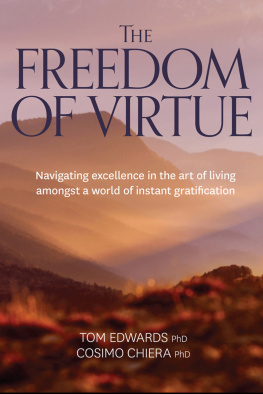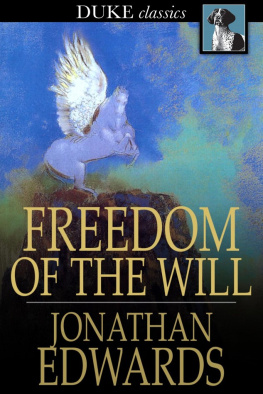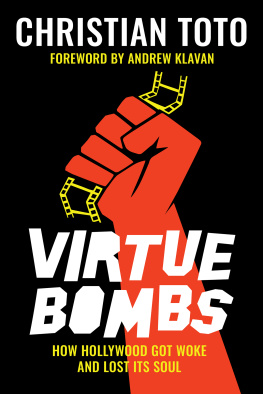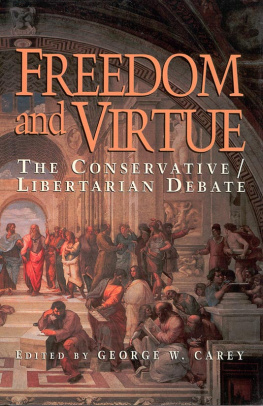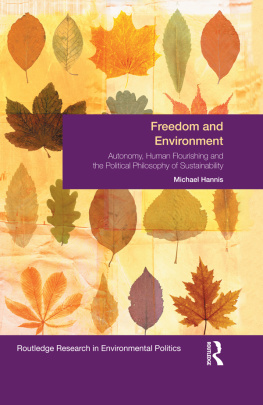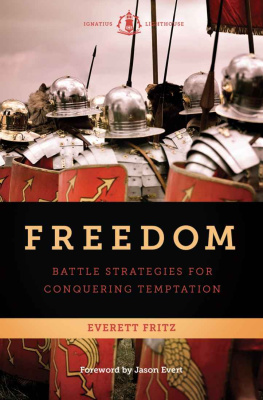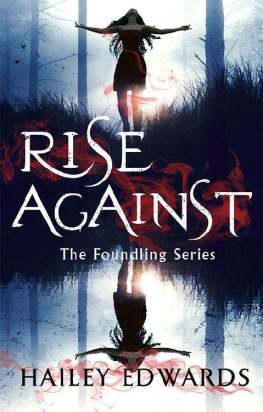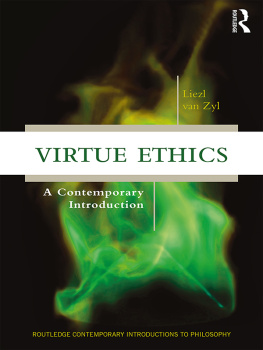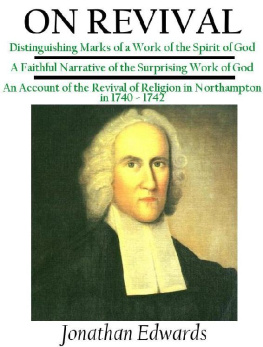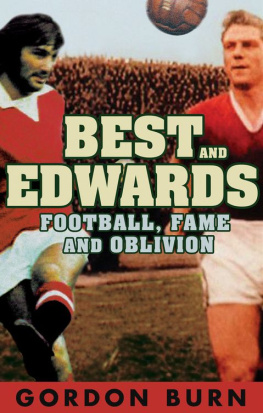Tom Edwards - The Freedom of Virtue
Here you can read online Tom Edwards - The Freedom of Virtue full text of the book (entire story) in english for free. Download pdf and epub, get meaning, cover and reviews about this ebook. year: 2020, publisher: Australian Academic Press, genre: Religion. Description of the work, (preface) as well as reviews are available. Best literature library LitArk.com created for fans of good reading and offers a wide selection of genres:
Romance novel
Science fiction
Adventure
Detective
Science
History
Home and family
Prose
Art
Politics
Computer
Non-fiction
Religion
Business
Children
Humor
Choose a favorite category and find really read worthwhile books. Enjoy immersion in the world of imagination, feel the emotions of the characters or learn something new for yourself, make an fascinating discovery.
- Book:The Freedom of Virtue
- Author:
- Publisher:Australian Academic Press
- Genre:
- Year:2020
- Rating:3 / 5
- Favourites:Add to favourites
- Your mark:
- 60
- 1
- 2
- 3
- 4
- 5
The Freedom of Virtue: summary, description and annotation
We offer to read an annotation, description, summary or preface (depends on what the author of the book "The Freedom of Virtue" wrote himself). If you haven't found the necessary information about the book — write in the comments, we will try to find it.
The Freedom of Virtue — read online for free the complete book (whole text) full work
Below is the text of the book, divided by pages. System saving the place of the last page read, allows you to conveniently read the book "The Freedom of Virtue" online for free, without having to search again every time where you left off. Put a bookmark, and you can go to the page where you finished reading at any time.
Font size:
Interval:
Bookmark:
We wish to gratefully acknowledge the help of the following people in the preparation of this book: Mr Tim Cutrona, Ms Diana Blackburn, Ms Nicolette Gan (PhD candidate), Ms Jui Gui, Dr Abey Gunasekarage PhD, Dr Chandana Hewege PhD, Dr Sharon Hoch MBBS, Dr Jayanthi Kumarasiri PhD, Ms Barbara Matheson, Mr Craig Oakley, Rev Dr Jeff Pugh PhD, Dr Katie Richardson PhD, Dr Michelle Sanders DMin, Ms Yim-Fong Voon, Ms Jennifer Saunders and Mr Michael Walker.
We also want to acknowledge the graciousness of our wives, Laura and Lisa, in allowing us to undertake such a large project.
In recognition of our broad readership we have used a diversity of reference material of which most is easily accessible. These sources have been placed under Endnotes at the end of the book. Further, some material is quoted for the benefit of the reader. Normal conventions apply except when an extended quote also forms the basis of a story. In this instance the text is blocked but the font size is not reduced.
In addition, italics have been used in three ways throughout the text. Consistent with APA style italics are used for: (1) the titles of books/movies, (2) when words are taken from other languages but not in common English usage, and (3) to indicate emphasis.
Some readers may be concerned by the fact that we have used the outmoded BC/AD dating system in a book that seeks to be culturally aware. We recognise this. Nevertheless the international standard for dating years commenced at what was believed to be the birth of Christ. In addition, nonacademic readers will be most familiar with the BC/AD abbreviations.
And a disclaimer: The Freedom of Virtue represents an introduction to the use of specific virtues to bring about a life well lived. It is written for educational purposes only. If aspects of the text are to be applied then please do so in accordance with your: (1) scope of practice, (2) your organisations policies/procedures, and (3) relevant codes of ethical conduct. If you wish to use aspects of this text for therapeutic outcomes then please seek guidance or training from Dr Edwards and Dr Chiera before doing so. They can be contacted at www.naturalintelligence.com.au.
T.E. & C.C.
T his book was born out of curiosity and frustration. The idea emerged, as so many do, over coffee at a little bayside caf we know well. Three interlinked questions occupied our thinking that summer morning about two years ago:
From our experience in Higher Education: Why are Millennials so delightful, but often struggle to cope with the demands of a degree?.
From Cos experience in the corporate world: Why do some highly skilled people stay at relatively low positions in the workforce but others, who are less talented, rise to become senior managers?.
And from my (i.e., Tom) work in mental health: Why do some clients, who present with significant issues, improve while others do not? .
Ultimately, our conversation came around to Cos asking the personal question, What ingredients do my teenage daughters need to become capable women who are able to contribute to society?.
In discussing this we came to realise that what wed been asking about were those personal factors which made an individual stand out from the crowd, or which conferred excellence in the art of living. As we thought about the problem a little more we realised that the standard answers were not adequate to explain what we were grasping at. For example, our society places great emphasis on intelligence whether it is in school or in the workforce. But smart people are not immune from failure, nor even stupidity, from time to time. We also thought about family of origin as the classic psychological cause of so many personal struggles. But stand-out people seem to overcome their background, however deprived or traumatic. Even if we look at structural inequality within society (e.g., the haves vs. the have-nots) some people rise above their class to achieve great things. While we do not deny the benefit of a good set of genes, a stable family life, or a few brains in giving people a headstart in life this could not be the whole story. Even when we thought about psychological attributes such as resilience these too failed to explain stand-out people in any substantive way.
In frustration we turned to the life stories of people who embodied excellence to see if we could extract some key ingredient not yet seen. But as we read these stories we came to realise how difficult this task would be. For instance, gender seemed to play no part in excellence. Demographically, some who achieved great things did so off the back of a solid upbringing, yet excellence was often found as a consequence of overcoming a rough start in life. Nor was age an obvious factor in conferring excellence. While we like to attribute wisdom and mastery to older age there are plenty of stories of people who stood out amongst their peers quite young. In the end the only defining feature we could identify was not what these people had, but how they applied their talents.
At an existential level we also realised something else Stand-out people were marked by having a purpose to their lives. For some this was a noble cause, but for many more it was a visceral need to prove a point, or to prove others wrong. Paired with this was also a strong notion of respect which took several forms. These excellent people had the respect of colleagues and friends, but also self-respect. In addition, they often had the respect of those with whom they clashed. Be it on the sports field, or across a parliamentary chamber, people of excellence are respected for who they are even if what they are doing is opposed by many.
With this in mind we felt able to pursue excellence in the art of living as a topic of study. To do so required us to lean on the psychological literature, and especially Positive Psychology, but also go much further. Over the intervening months Cos and I read biographies, engaged some of the worlds great literature, thought about Anthropology as the study of people, touched on religious ideas and came to terms with aspects of Philosophy. That people are also flesh and blood meant that we could not deny a debt to Biology either. In the end we discovered that human excellence is a rich dish. It is only by combining many ingredients that we can avoid the thin taste of morality, the bitterness of character development or the honey sweetness of the happiness gurus. What we present to you, instead, is a dish called virtue.
Virtue sits in the background of daily life, but influences everything we say and do. It is about a persons style and substance in spite of their physical strength or intellect. In this way virtue is for us all, not only for the strong and the smart. While it would be easy to write a book dedicated to extolling the virtues this is not our aim. We want to identify those virtues which are foundational to our humanity. In doing so our hope is that you, and those whom you care about, will learn to use virtue and thus live to the better angels of your nature.
While some readers familiar with Positive Psychology may consider this a retelling of what Martin Seligman already espouses we would argue otherwise. While there will, inevitably, be some overlap wed differentiate our approach in the following ways.
Ours is not a search for happiness, but for purpose, for respect and for excellence in the art of living. In fact we would argue that finding virtue will not often bring happiness. Indeed the virtuous person often stands alone and risks much in life to achieve great things or to live authentically.
Nor is virtue about good character. As we will explain in the opening sections of good character is a slippery fish. So much so that some people with an apparently bad character are most virtuous.
Font size:
Interval:
Bookmark:
Similar books «The Freedom of Virtue»
Look at similar books to The Freedom of Virtue. We have selected literature similar in name and meaning in the hope of providing readers with more options to find new, interesting, not yet read works.
Discussion, reviews of the book The Freedom of Virtue and just readers' own opinions. Leave your comments, write what you think about the work, its meaning or the main characters. Specify what exactly you liked and what you didn't like, and why you think so.

